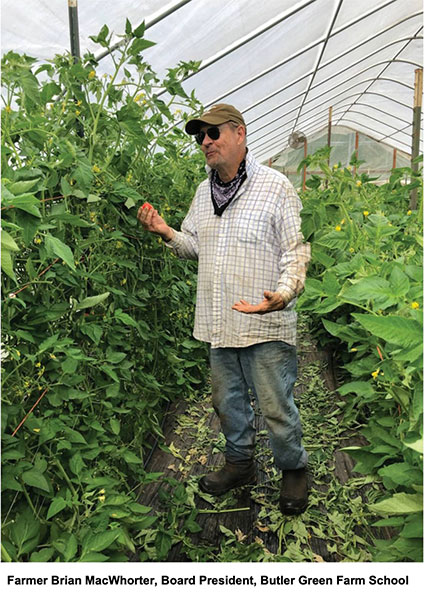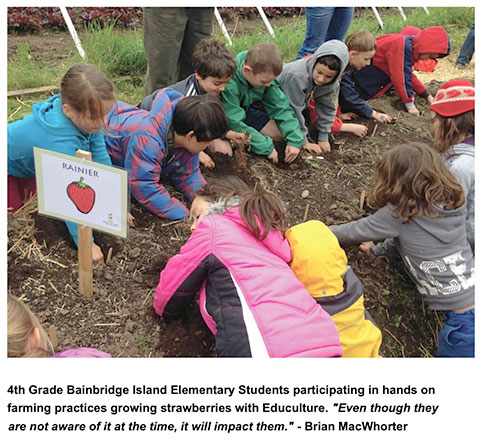
- By Erin Parker
My life was changed by a tomato. On a cool July morning at the Bain bridge
Farmers Market, I watched a woman fondle a ripe heirloom tomato picked fresh
that morning, ponder what she would make with it (maybe a sandwich or a caprese
salad), remark on how lovely it was, weigh it and, finally, complain about the
price. I wanted to defend the time and effort, the labor and love put into growing
every toma to there, but a calm hand settled on my shoulder and a happy,
low voice said to the woman, “It is a perfect tomato."
Farmer Brian MacWhorter sold the woman that tomato and a bag full of produce.
She had no idea about farming and the work took to put that tomato into her hand.
Most people don’t. MacWhorter has dedicated his life to changing that. “My
mission is to educate and pre pare our next generation of success ful
local farmers,” said MacWhort er. He developed the Butler Green Farm
School, where over the last 20 years he has hosted more than 75 young farmers
as interns on 10 acres of public and privately leased farmland on Bainbridge
Island. Their passion and dedication as young stewards is helping guaran tee
community access to delicious and healthy local food.
“He was always willing to make every moment like a teachable lesson,” said
Zach Fulton, an in tern turned full-time farmer who worked with MacWhorter
from 2017-23. “He wanted us to work hard, but he was also there to stop
and show us what we were seeing and explain why things were the way they were.”
In an interview with John Garfun- kle, the former director of EduCul- ture, MacWhorter
said, “Some of these kids who have just finished their undergraduate programs
are no different from preschoolers. They’re out there with all these questions
about what they’re go ing to do in life. And now it's even more critical
because of their age - the pressure of trying to get their life together - with
the pressure of college loans, their parents’ ex pectation. You go
to class - you do the whole thing - but there’s real ly no one telling
you what to do next or how to do it. You have all these things thrown at you
through the years. These interns - 22, 24, 26 years old - they have no idea what
to do next. You’re just taking all this stuff in just like you did in elementary
school. The realization that I can impact them as much as I can impact the preschoolers
is kind of mind boggling.”
MacWhorter embraced being an educator. Through a partnership with the EduCulture
Program and WSU Extension’s Edible Educa tional Program (the first
nationally accredited Edible Program for lo cal schools in the US) Butler
Green Farm School will provide garden plots for Bainbridge Island students in
kindergarten through 4th grade. The students will get their hands in the soil,
plant seeds and care for the seedlings, and eventually eat carrots right from
the field. The goal is to develop an early un derstanding of where good
food comes from and develop healthy snacking habits early in life.
“He so clearly believes in the idea of feeding the community, and then
growing food, that I think it’s like his passion,” said Renee Ziemann,
Kitsap Fresh Board Co-President. Ziemann worked for MacWhorter from 2010-13. “The
way he farms is so beautifully intuitive. I was in spired by his technical
knowledge but he also made it seem possible to farm without having every de tail
nailed down. He's got this big picture of what's gonna happen.”
MacWhorter’s big picture includes several small parcels of land spread
across the island, includ ing about two acres on the histor ic Suyematsu
Farm on Day Road. Founded in 1928, it is the oldest, most continuously farmed
land in this region (with the exception of the period of Japanese-American exclusion
during WWII) and is the last of the original family farms on Bainbridge. Akio
Suyematsu was the eldest son of the original family and farmed the land since
childhood. He died in 2012 at age 91 and is credited for guiding the farm into
the 21st century. He was also a mentor to MacWhorter, who continues to pass those
lessons on to the next generation of farmers.
“He was able to give me a really intimate look at what it takes to farm
in these modern times," said Fulton. "He has the history of Akio Suyematsu
so it was like he was leaning on the history of farming that he learned from
Akio and then was able to modernize it and teach us." Through the years
of work ing with interns and the desire to incorporate younger students
into farm education, Butler Green Farm School developed
an extensive curriculum to study biology in the living soil, as well as the chemi cal
and physical properties of soil science. The curriculum is based on sound organic
farming practices

|
|
|
| including IPM-integrated
organic pest management, aerobic composting and compost teas, no till weed
control, and biodynamic practices incorporating seasonal extension techniques. Instruction
is done through classes given by qualified staff, along with guided hands-on
field instruction.
“Brian is just one
of those peo ple that has this ability to kind of create this incredible
communi ty around him,” said Mae Tooey, an intern with Butler Green
Farm from 2020 through 2021. “He has just a great ability to gather folks
together from all different kinds of life and create a work atmosphere and experience
that really encour ages people to figure out what their assets are and then
kind of go with that. It's a lot of creativity and team building.” That
commu nity includes partnerships with the Harbour Public House (all of our
salad greens are grown by Butler Green Farm), Kitsap Mentor Pro gram (WSU
Extension Program), the Conservation District, and the WSU Dept of Agriculture.
Guest speakers from these organizations offer insight into their own per sonal
studies in current agricultur al research projects and practices. Butler
Green Farm School also encourages and supports indepen dent study projects
for the interns that increase their own interests in other exciting fields of
agriculture like growing mushrooms, aqua ponies, and beekeeping.
“We’ve had about 75 interns in the
past 20 years - individuals who for some reason wanted that ex perience
of working on an organ ic farm, either for their resume, or because it’s
a cool thing to do, or they’re fascinated, or they’re a foodie person,” said
MacWhort er. “Then they live through that 6-month tour of a farm
and, all the sudden, life has changed. They didn’t know that was available,
that you can live that type of life style,”
“Working with him influenced me to want to farm,” said Ziemann.
She went on to start Full Tilth Farm in Poulsbo with another young farmer. “I
felt like he really believed in me too. He helped me out acquiring tools when
I moved to my farm, he was really encour aging.” And he demonstrated
it is doable. It’s definitely gonna take every day of your life, yet Bri an
has the fortitude to push on through even the hardest, darkest days of winter."
Last summer, fifteen years af ter the incident with the tomato lady, we
sat on the front porch and looked out at the land I was farming. (I worked at
Butler Green Farms from 2009-11). We’d spent the afternoon troubleshooting
ir rigation and were enjoying the warm sun and the buzz of bees. He told
me that now it is our time, the time for all of us who value farm ing and
our children’s health and the future of our country’s farm land,
to help and support the huge endeavor of farm education.
“I was out in the strawberry field with my 2-year-old granddaugh ter,
Gemma, for the first time, she was discovering the wonder of picking huge, sweet
berries on her own,” MacWhorter said, grinning at the memory, “That
smile of joy on her face as strawberry juice rushed down from her mouth was so
heartfelt. I was immediately re minded of why I keep farming and why I get
so excited when kids first find the garden wonderland.”
“If everyone who has ever spent time on a farm in their life takes time
to remember how that has im pacted their own life, and if they want their
kids and their kids to have the same opportunity, then it is time to save what
farms we have left. This is what gets me up in the morning,” said MacWhorter.
With continued support from the community, his momentum can carry on and shape
the future of farming and help preserve pre cious farmland throughout our
country. It takes more than one tomato and one farmer to create change.
Donations for Butler Green Farm School, a 501(c)(3) Non-Profit
Corporation, can be sent to PO BOX 4458 Rollingbay, WA 98061



|
|
|
|
|
